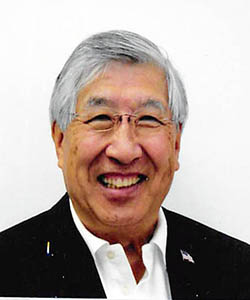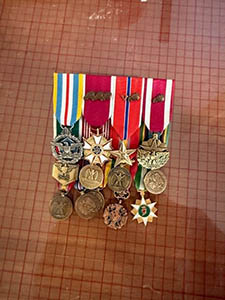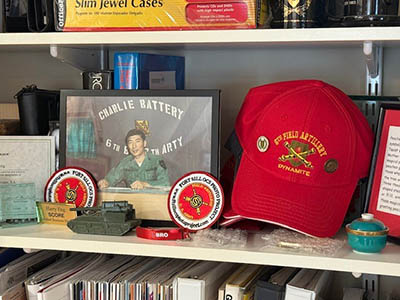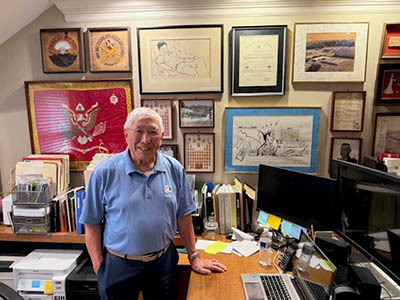Army Vietnam War St. Charles, IL Flight date: 06/18/25
By Charlie Souhrada, Honor Flight Chicago Veteran Interview Volunteer
Harry Eng graduated from Chicago’s Senn High School with honors and was ready to repeat his academic success as a pre-med student at the University of Illinois. During his sophomore year, however, he switched his major, lost his way, and was invited to take a semester off. That’s when the Army came calling and Harry’s life turned around.
Harry was born August 30, 1942, the fourth of Harry Joseph and Nora Eng’s six children – four girls and two boys. His father was a restaurateur who owned and operated several iconic downtown Chicago establishments, including Hoe Sai Gai, Shangri La, House of Eng, South Pacific, The Orchid, and more.
“My first job was at the House of Eng where I worked as a dishwasher,” Harry says. “My dad told the dishwasher ‘I’m giving you my son for two weeks. Make sure he knows everything about dishwashing when he’s done.” Next Harry learned to clear tables and carry a tray working as a bus boy before learning the menu in detail and becoming a waiter. Then it was back into the kitchen as an apprentice Chinese chef to acquire food prep and cooking skills. It was here that Harry learned how to debone a whole chicken in 15 minutes using a cleaver – a skill he still remembers.
In the fall of 1960, Harry left for Champaign where he started at the U of I as a pre-med student. “I excelled in the sciences in high school and thought being a doctor would be kind of cool. Unfortunately, like so many incoming freshmen, the new-found distractions of campus life got the best of me. I soon realized my grades that first year, while average, weren’t going to be good enough to get into med school.” Drawing from a lifelong interest in business and management, he transferred into the College of Commerce as a probationary student which required him to earn a C average or higher for all coursework.
Ironically, he got “Cs” in every one of his classes except Air Force ROTC , where his shoddy attendance record that semester caught up with him. “The major who taught the class had a strict, three unexcused absences and you flunk rule. My appeal to the dean to overlook the failure was denied considering all my cut classes – I was out!” That moment was an epiphany. “I grew up more in that five-minute exchange than I had all the previous years of my life.” Two weeks later, the draft board invited him to pay them a visit and Harry started a mad scramble for alternatives.
“I checked the reserves or National Guard, and discovered all the smart guys had already done that,” he says. That is when the local Army recruiting office caught his eye and he was offered a guaranteed seat in an electronics training course as a Cryptographic Repairman. The price: sign up for three years rather than wait to be drafted and serve just two. Harry accepted the electronics schooling opportunity. His first stop was eight weeks of basic training at Fort Knox, Kentucky. After successfully completing basic, he was sent to Fort Monmouth, New Jersey, for 36 weeks of military occupational specialty (MOS) training as a general cryptographic repairman. “Unlike most new recruits who report with just a duffle bag of military attire, I reported dressed in civilian clothes, military gear in my duffel bag, and a bowling ball.” He explains throughout high school and college, he was one of the better bowlers in Chicago, averaging more than 200 when he entered the Army. In fact, during his first night at Monmouth, Harry made $100 bowling against NCOs.




Aside from earning a reputation in the bowling alley, Harry graduated as the “honor graduate” of his class and applied for and became one of two people selected that year to attend officer candidate school, which served as the launchpad for his 30-year military career.
In 1966, he graduated from the Artillery Officer Candidate School (OCS), at Fort Sill, Oklahoma, as a second lieutenant and within six months began to distinguish himself first as a fire direction officer and next as a firing battery executive officer in combat with the 1st Infantry Division in Vietnam from 1966-67.
He then moved through a series of artillery roles including gunnery instructor in the Artillery School, command of firing batteries in Korea and Germany, and culminating with command of the artillery battalion supporting the 2nd Infantry Division’s 3rd Brigade guarding the demilitarized zone in Korea.
In addition to being selected for every level of advanced military education, including the Army Command and General Staff College at Ft. Leavenworth, KS, and the Industrial College of the Armed Forces at Ft. McNair, VA, the Army sent Harry back to the U of I to finish his undergraduate education in 1973. This time, however, he was a straight A student in accounting and successfully passed the arduous Certified Public Accounting (CPA) exam. The Army later sent him to Syracuse University in New York as part of the Army’s Comptrollership Program where he earned a master’s degree in business administration in 1978, graduating at the top of his class. His next assignment brought him to Washington, DC, and the first of several assignments to the Army Staff in the Pentagon where his financial education was used conducting affordability analyses critical to developing the Army’s five-year plan and annual budget submission to Congress. Later Harry served as the Comptroller of the Army National Guard Bureau in Washington, the Chief Financial Officer of the U.S Forces in the United Nations Command in Korea, and as the Commander of the United States Army Force Integration Support Agency (USAFISA), which orchestrated the reduction of the Army from 780,000 to just over 500,000 soldiers in the early 1990’s.
Throughout his distinguished military career, Harry — who retired from the Army in 1994 as a colonel — was awarded numerous honors, including the Defense Superior Service Medal, four Legions of Merit, two Bronze Stars (one awarded for valor), the Meritorious Service Medal, two Army Commendation Medals, and the Army Staff Identification Badge.
After leaving his military career behind, Harry joined Sears in Hoffman Estates, where he developed strategic procurement practices until retiring from the company in 2005. From there, he renewed his tax knowledge by taking H&R Block’s tax preparation training and hung out his shingle as Fox Valley Tax Solutions, then Eng Tax Services, where he continues to serve as a consultant.
Nowadays, he enjoys spending time with his partner, Frances, working on his golf game, tending to his collection of fish, playing bridge, and celebrating his son, Chris’ adventures.
Of his military career, Harry says the Army gave him a chance to excel. “It gave a kid who had lost his grip on life an anchor. Not everybody gets that opportunity. I’ve been very fortunate!”
Thank you for your dedicated service to the country, Harry. We hope you enjoy your Honor Flight!


